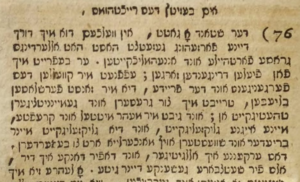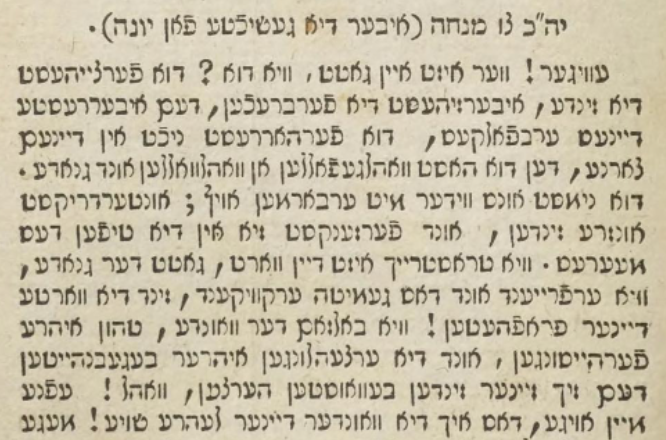| Source (German) | Translation (English) |
|---|---|
Im Besitz von Reichthum. |
In possession of wealth. |
Der Stand, o Gott, in welchem du mich durch deine Vorsehung gesetzt hast, hat allerdings große Vortheile und Annehmlichkeiten; er befreit mich von vielen dringenden Sorgen; öffnet mir Quellen des Vergnügens und der Freude, die mir sonst verschlossen blieben, treibt mich zur größern und gemeinnützigen Thätigkeit an, und giebt mir mehr Mittel und Kräfte, meine eigne Glückseligkeit und die Glückseligkeit meiner Brüder und Schwestern auf mancherlei Art zu befördern. Das erkenne ich, Allgütiger, und dafür danke ich dir, als für schätzbare Geschenke deiner Güte. O lehre sie mich stets so ansehen und gebrauchen, wie es deinem Willen und meinem Heile gemäß ist, ich betrachte sie nicht als Beweise meiner größern Würdigkeit, oder für Merkmale deines größern Wohlgefallens an mir; da ich weiß, daß manche meiner ärmern Schwestern weit verständiger und besser, und deiner Gunst würdiger sind als ich. |
The position, O God, in which you have placed me by your providence, has indeed great advantages and comforts; it frees me from many urgent worries; opens founts of pleasure and joy for me, which would otherwise remain closed to me, impels me to greater and more charitable activity, and gives me more means and powers to promote my own happiness and the happiness of my brothers and sisters in many ways. I recognize this, All-Good One, and I thank you for it, as for the precious gifts of your goodness. O teach me always to look upon them and use them in a way that is in accordance with your will and my salvation; I do not regard them as proofs of my greater worthiness or as signs of your greater good pleasure in me, since I know that some of my poorer sisters are far more understanding and better and more worthy of your favor than I am. |
Laß mich erkennen, o Gott, daß der Werth des Reichthums nicht in dem Besitz, sondern in dem guten, edlen Gebrauch desselben liegt, den ich davon mache! Hüte mich vor den Gefahren, die mit meinem Stande verbunden sind, vor Versuchungen und Reizungen zum Stolz, zur Eitelkeit, zur Trägheit, zu einem üppigen Leben, zur Versäumung der heiligen Pflichten, zur Gottvergessenheit und zu einer ganz irdischen Sinnesart. Hüte mich vor der Versuchung zur Verachtung und Bedrückung meines armen Bruders, zur Härte und Fühllosigkeit gegen fremdes Elend. Laß mich stets eingedenk sein deines heiligen Wortes: „Schließe nicht Herz und Hand zu vor deinem dürftigen Bruder, öffne deine Hand und leihe ihm, nach seinem Bedürfniß. Sei nicht mißgünstig gegen deinen armen Bruder, denn wenn er wider dich zu Gott ruft, so haftet die Sünde an dir. Zu diesem Behufe segnet dich der Ewige in allen deinen Geschäften. Nie wird es an Armen im Lande fehlen, darum gebiete ich dir: öffne deine Hand deinem armen und dürftigen Bruder.” (5. Mose 15, 7-11) Hüte mich ferner, o Gott, vor ungerechtem Gut, das keinen Segen bringen kann, nach dem Ausspruch der heiligen Schrift: „Wer ungerecht Gut erwirbt, wird es in der Hälfte seiner Tage verlassen müssen.” (Jeremia 17, 11) Möge ich nie meinen Reichthum andern auf eine kränkende und beleidigende Art sehen und fühlen lassen; nie mich desselben als eines wahren Vorzugs vor andern rühmen; nie Vergleichungen zwischen meinem und anderer Aufwand anstellen, und den Armen verachten, oder ihm mit Härte und Verächtlichkeit begegnen; nie vergessen, daß der Arme ein Mensch wie ich, daß er mein Bruder ist. |
Let me know, O God, that the value of wealth lies not in the possession of it, but in the good and noble use I make of it! Guard me from the dangers that are connected with my status, of temptations and irritations to pride, to vanity, to sloth, to a lavish life, to the neglect of holy duties, to forgetfulness of God and to a completely earthly way of thinking. Guard me from the temptation to contempt and oppression of my poor brother, to harshness and insensitivity to the misery of others. Let me always remember your holy word: “Do not close your heart and hand to your poor brother, open your hand and lend to him according to his need. Do not be displeased with your poor brother, for if he cries out to God against you, sin clings to you. For this purpose, the Eternal blesses you in all your dealings. There will never be a lack of poor in the land, therefore I command you: open your hand to your poor and meager brother.” (Deut. 15:7-11) Guard me further, O God, from unrighteous goods that can bring no blessing, according to the saying of the holy Scriptures, “He who acquires unrighteous goods will have to leave them in half his days.” (Jeremiah 17:11) May I never let others see and feel my wealth in an offensive and insulting way; never boast of it as a true advantage over others; never make comparisons between my efforts and those of others, and despise the poor, or treat them with harshness and contempt; never forget that the poor person is a person like me, that they are my brother. |
Nie will ich dem Armen und Dürftigen auf eine prahlerische Art wohlthun, nie meine Wohlthaten erst durch ungerechte Vorwürfe und kränkende Erniedrigungen erkaufen lassen, nie ihn auf eine beschämende Weise an diese Wohlthaten erinnern, nie Dank, den das Herz verweigert oder niedrige Gefälligkeiten oder Dienste von ihm fordern, laß mich im Verborgenen, ohne alle Vergeltung wohlthun, und auch dem Undankbaren, dem Feinde Gutes erweisen, wie es in der heiligen Schrift heißt: „Hungert dein Feind, gieb ihm Brod, durstet er, gieb ihm zu trinken; erregst du auch in ihm ein unangenehmes Gefühl, Gott wird es dir doch vergelten.” (Sprüche 25, 21-22) — |
Never will I do good to the poor and needy in a boastful way, never let my good deeds be bought by unjust reproaches and grievous humiliations, never remind him of these good deeds in a shameful way, never give thanks that the heart refuses or demand low favors or services from him, let me do good in secret, without any retribution, and also do good to the ungrateful, to the enemy, as it says in the holy scripture: “If your enemy is hungry, give him bread to eat, if he is thirsty, give him water to drink; if you stir up any displeasing feeling in him, God will yet repay you.” (Proverbs 25:21-22) — |
Heilige mein Herz, Allgütiger, daß es sich nicht an den Reichthum hänge, und ihn für die einzige Bedingung der Zufriedenheit und Glückseligkeit halte, laß es nicht nach Achtung und Ehrenbezeugung um des Reichthums willen geizen, laß mich vielmehr Schätze für die Zukunft sammeln, die nie verschwinden, nie sich vermindern, die kein Zufall rauben kann. Laß mich reich werden an edlen Gesinnungen und Thaten, die auch dann, wenn ich meinen Reichthum verliere, mein wahres Eigenthum bleiben, mich in das Grab und in die Ewigkeit begleiten, und die ein nie versiegender Quell des Segens und der Freude für mich sein werden. Amen. |
Sanctify my heart, All-Good One, so that it does not cling to wealth and consider it the only condition of contentment and happiness; let it not be stingy with respect and honor for the sake of wealth; rather, let me gather treasures for the future that will never disappear, never diminish, that no chance can rob. Let me become rich in noble deeds and actions, which, even if I lose my wealth, will remain my true property, accompany me into the grave and into eternity, and which will be a never-ending source of blessing and joy for me. Amen. |
“Im Besitz von Reichthum” was translated/adapted by Yehoshua Heshil Miro and published in his anthology of teḥinot, בית יעקב (Beit Yaaqov) Allgemeines Gebetbuch für gebildete Frauen mosaischer Religion. It first appears in the 1829 edition, תחנות Teḥinot ein Gebetbuch für gebildete Frauenzimmer mosaischer Religion as teḥinah №76 on pp. 115-117. In the 1835 edition, it appears as teḥinah №77 on pp. 139-141. In the 1842 edition, it appears as teḥinah №80 on pp. 144-146.
We welcome corrections and improvements. The transcription of the German from Latin script in Fraktur type provided machine-readable text for a machine translation by DeepL, which we then edited for accuracy and clarity. –Aharon Varady
Source(s)



“Im Besitz von Reichthum | [Prayer while] in possession of wealth, a teḥinah by Yehoshua Heshil Miro (1829)” is shared through the Open Siddur Project with a Creative Commons Attribution-ShareAlike 4.0 International copyleft license.






![Morgengebet [№2] (Yehoshua Heshil Miro 1829) - cropped](https://opensiddur.org/wp-content/uploads/2022/05/Morgengebet-№2-Yehoshua-Heshil-Miro-1829-cropped.png)



Leave a Reply